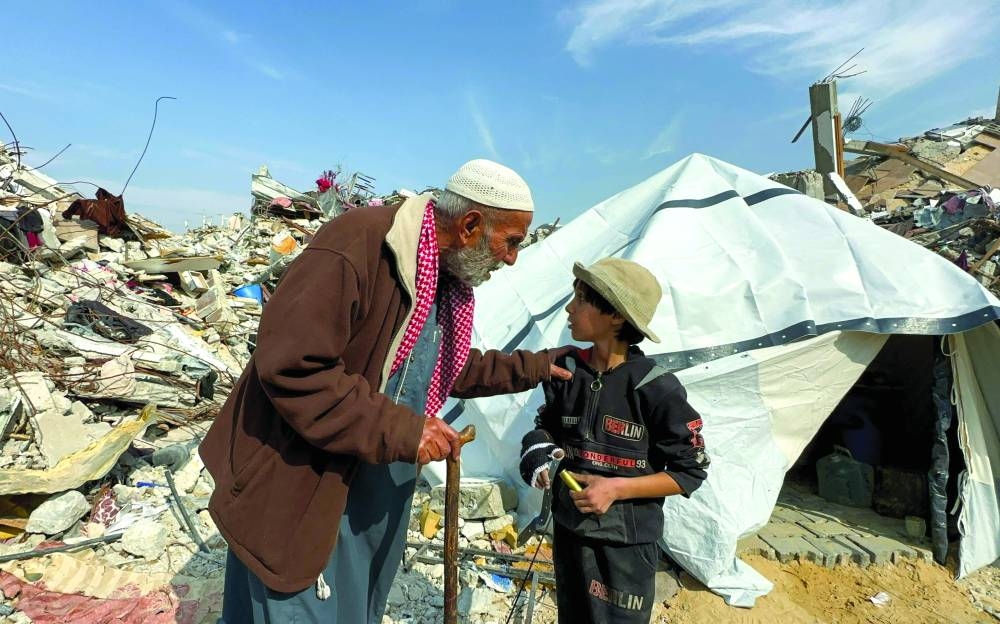The joy of thousands of Palestinian families who made it back home in north Gaza after a ceasefire with Israel is turning to despair as the cold reality of uninhabitable, bombed-out homes and dire shortages of basic supplies sets in.
Many have begun complaining about a lack of running water that forces them to queue for hours to fill plastic containers for drinking or cleaning. With most homes now heaps of rubble as far as the eye can see, returnees have scoured whatever useful items remain from their property to erect makeshift tents.
At night, residential districts laid to waste by Israeli airstrikes and shelling sink into darkness for lack of electricity or fuel to operate standby generators.
“There is nothing, no life, no water, no food, no drink, nothing for living. Life is very, very hard. There is no Jabalia camp,” said Hisham El-Err, standing next to the rubble of his multi-storey house in the biggest and mostly densely populated of the Gaza Strip’s eight historic cinder-block refugee camps.
His extended family is now huddling in tents, which offer scant protection from Gaza’s mid-winter chill.
By late on Tuesday, Gaza’s Hamas authorities said most of the 650,000 people displaced from the north by the war had re-entered Gaza City and the north edge of the enclave from areas to the south where fighting was less intense and destructive.
Many of those returning, often laden with what personal possessions they still had after months of being shunted around as battlegrounds shifted, had trekked 20km or more along the coastal highway.
Fahad Abu Jalhoum returned with his family to Jabalia from the Al Mawasi area in south Gaza but the destruction they found was so pervasive they had been forced to go back south.
“It’s just ghosts without souls (in the north),” Abu Jalhoum told Reuters back in Al Mawasi. “We all missed the north but when I went there I was shocked. So I returned to (the south) until we get relief from God.”
A Hamas official who spoke on condition of anonymity said smaller amounts of fuel, cooking gas and tents had been brought into Gaza than what had been agreed in ceasefire negotiations.
The Hamas-run Gaza government media office put the initial need of tents at 135,000, but the Hamas official said only around 2,000 had got in since the deal took effect on Jan 19.
He also said work to rehabilitate hospitals and bakeries knocked out by the fighting had not begun, contrary to the deal.
“All of this has led to dissatisfaction within the (Palestinian) resistance and may affect the smooth implementation of the agreement,” he told Reuters, declining to elaborate. “We urge the mediators and guarantors to make the utmost effort to fulfil the terms of the agreement.”
Officials in Israel, which controls all entry points into Gaza, did not immediately respond to a request for comment.
Under the deal, 33 hostages held by Palestinian fighters in Gaza are to be freed in the first six weeks of the ceasefire in exchange for hundreds of Palestinian prisoners, many of them serving life sentences in Israel.
Seven hostages and 290 prisoners have so far been exchanged. Three more hostages are to be swapped for tens of Palestinian detainees today, according to Hamas and the smaller allied Islamic Jihad group.
A second stage of the deal, due to begin by Feb 4, is meant to open the way to the release of over 60 other hostages, including men of military age, and a full Israeli military withdrawal from Gaza. If that succeeds, a formal end to the war could follow along with talks on the monumental challenge of reconstructing Gaza, now widely demolished by an Israeli onslaught that killed almost 47,000 Palestinians, according to Gaza’s health ministry.
The conflict was triggered by a Hamas-led cross-border storming of southern Israel.
In Jabalia, Khamis Amara returned to the ruins of his house to dig for the bodies of his father and brother, among the roughly 10,000 people missing and feared dead in Gaza, according to the local civil emergency service.
“I was once under the rubble with my father and brother, just as they still are. But I made it out,” Amara said.
“Life here is unbearable. Honestly, it’s all a lie. Those in the south should just stay there - it’s better for them.”
Region
Joy turns to despair as Gaza returnees struggle to settle in enclave’s north
*Palestinians face harsh conditions, some return south after finding north uninhabitable
*'Life here is unbearable; those in the south should just stay there - it's better for them,' says one displaced Gazan
*Hamas signals 'discontent' at pace of steps to implement humanitarian terms of Gaza ceasefire deal with Israel

A Palestinian man, who was displaced at Israel’s order during the war, speaks with a child after returning to his destroyed house, amid a ceasefire between Israel and Hamas, in Jabalia refugee camp in the northern Gaza Strip.
